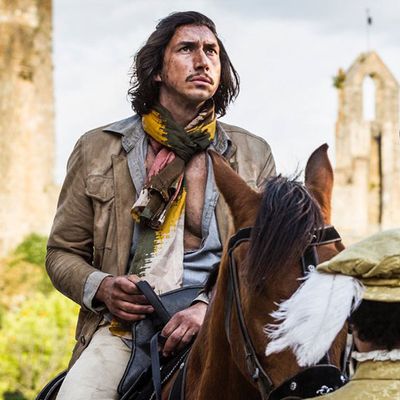
“And now, after 25 years of making and unmaking, a film by Terry Gilliam.” So reads the opening title card of The Man Who Killed Don Quixote, and even before a single frame of the film, you kind of want to tell the film to zip it; that it’s jinxing itself. Of course the film’s reputation precedes it — Gilliam has had multiple iterations of it collapse over the past two decades. Even its screening at Cannes was not certain until the second day of the festival. But once it actually starts rolling, one could hope that it could carve out a space for itself and exist separately from the drama surrounding it. Clearly, it cannot, but that’s not what sinks it in the end.
There is a good idea for a film somewhere in this finished product, the story of which bears the erasure marks of previous versions of itself. Toby (Adam Driver) is a hotshot director shooting a vodka commercial in Spain, wasting his budget, chasing production assistants and sleeping with the producer’s wife (Olga Kurylenko). One night at a restaurant, a bootlegger comes by with DVDs, and one of them is Toby’s first film, an adaptation of Don Quixote shot in a village nearby. Toby buys it and watches it and the experience starts flooding back to him, the excitement of working on a student budget and creating something out of nothing, the village girl he fell for and cast in the film (Joana Ribeiro), and particularly the old man he found to play Quixote himself (Jonathan Pryce).
He ditches his set and motorcycles off to the village, where he finds that the old man is still there, and has never broken character since the film wrapped. In other words, he has basically become a real-life Don Quixote, who was himself an actor of sorts stuck in a role. Quixote sees in Toby his Sancho Panza, and Toby, feeling more than a little guilty for having impacted this old man’s life in such a way, plays along and joins him on his “quest,” the reality of which becomes more and more slippery as it goes on — Quixote’s delusion might be catching.
As a film about filmmaking, which Don Quixote cannot help but be, the premise has a lot of potential to talk about a kind of ethics of creativity, especially the ethics of creating something with as big a footprint as a feature-length film. It seems easier to ruin other people’s lives in the course of a film production than not to; is there any way that can that be mitigated? What happens when people, specifically actors, can’t escape the headspace of the roles they are made to play, long after the production has wrapped and everyone else has managed to move onto the next?
But Gilliam has a blindspot, and a pretty untimely one at that. It’s rough stuff when Kurylenko, decked out in a blonde wig and looking like some corrupt succubus of the male imagination, throws herself at Toby, rougher when Toby feels up the assistant whose name he can’t remember on set (it’s a joke!). Counter to these wicked and/or disposable sluts is Angelica, the village girl, who later learn was 15 (!) when Toby first wooed her with his camera. “You were so young,” he says later after they reunite, then catches himself — “Not that you’re old now, you’re still very young.” This is how you tell a woman she’s still as beautiful as ever in Gilliam’s bumblingly misogynistic fun house.
Angelica, it turns out, was also impacted by Toby’s production. After the film wrapped, she went to Madrid to be a actress, but it didn’t quite work out the way she hoped. When she reveals that she had worked as an escort at one point, the score gasps with lamentation. As the film reorients itself around protecting her purity, and quite literally pits her as the Madonna to Kurylenko’s whore, it feels like Quixote has gotten lost in some very strange weeds. The experience of watching it, especially given its dreamlike unreality and head-scratching punnery (this is a deeply unfunny movie) is like listening to a doddering old man for whom every story — about art, politics, local goings on — ends up being about how every woman is an evil witch that can’t be trusted. There’s enough of a germ of something in Don Quixote that you find yourself shaking your head by its climax, wondering, wait, what were we talking about again?
Quixote lives in the end — the delusions of art and meaning and grandeur are too compelling to not be passed on down the ages to whatever romantic sucker buys into it next. Hopefully, though, Gilliam can finally put him to bed — and with him some of the fustier ideas that seem to have festered up alongside him.

